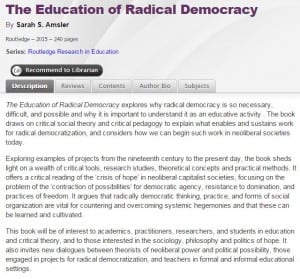First International Conference on Anticipation
November 5-7 2015
University of Trento, Italy
Anticipation is coming to the fore as an emerging field of study that is influencing a wide variety of disciplines. This international conference will explore the interaction among anticipation, uncertainty and complexity. Visit the conference website for further details.
We are now accepting paper abstracts for a stream on ‘Education and Anticipation’
Deadline: April 30, 2015
Education has long been understood as one of the primary mechanisms by which societies and individuals have sought to tame the future by acting on the present: future needs are forecast, educational interventions are designed, human capabilities and certificates that can act as talismans against future insecurity are achieved. In a morphogenetic society (Archer, 2012), in which radical novelty and unpredictable change are the norm, however, this linear model of projection and intervention is far from adequate. John Dewey once even argued that ‘the ideal of using the present simply to get ready for the future…omits, and even shuts out, the very conditions by which a person can be prepared’ for one (1938). How, then, might we begin to reconceptualise an educational system that is able to build personal, collective and societal capacity to hope and to create better futures in conditions of ongoing and radical disruptions? What new educational structures and practices – both inside and outside conventional schools and universities – are emerging in these conditions? What new conceptions of ‘being educated’ are emerging in these conditions and which should we be working towards?
This session invites proposals that provide a robust analysis of the contemporary situation and that also begin to identify sites of possibility and examples of potential change. We are interested in proposals from across the full range of disciplines, from sociology to computer science to philosophy.Papers might be interested in exploring issues that include but are not limited to:
The ‘Educated human’ in the morphogenetic society (What does being ‘educated’ mean in conditions of radical change?)
Prefigurative practice (the role of schools, universities and informal educational spaces as sites for the embodiment and development of ethical, reflexive anticipatory practices)
Technologies for democratisation (How/are new institutions, new technologies constructing the potential for more democratic and distributed forms of anticipatory educational practice?)
Who are the teachers & professors? (What new sites of expertise and insight are emerging that can build human anticipatory potential? How do these differ from existing patterns of professional development?)
Proponents
- Keri Facer (University of Bristol)
- Sarah Amsler (University of Lincoln)
Relevant information To submit an abstract to this workshop send a mail to both Keri Facer (keri.facer@bristol.ac.uk) and Sarah Amsler (samsler@lincoln.ac.uk).
- Further information on the conference www.projectanticipation.org
- Session’s speakers should register and pay the conference fee:
- Early registration (before 1 September 2015): € 150
- Late registration (from 1 September 2015): € 200
Important dates• Abstract submission: 30 April 2015
• Acceptance notification: 15 May 2015
• Final program: 15 June 2015
• Early registration: Before 1 September 2015
• Deadline registration: 20 October 20
